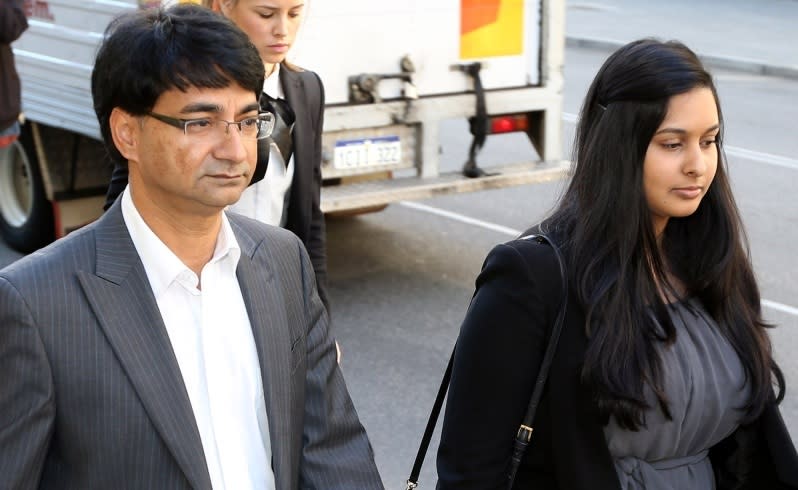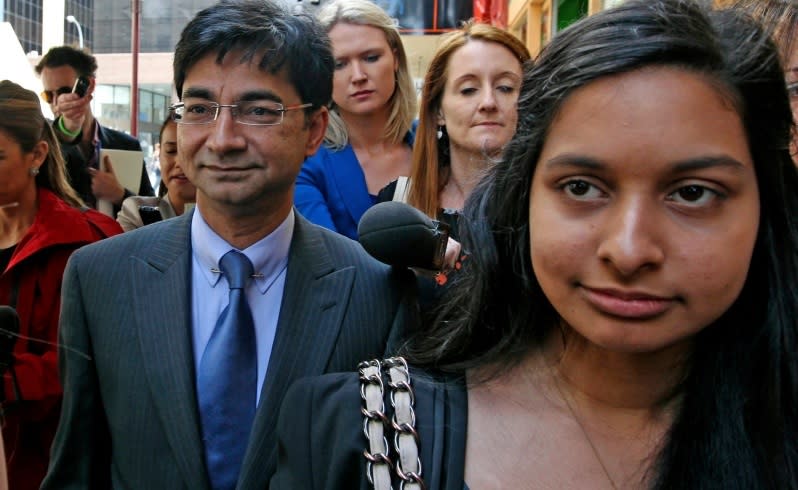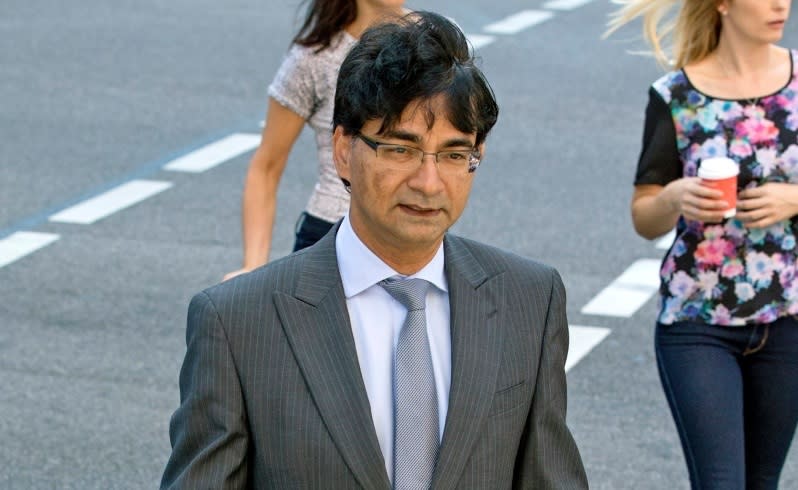Rayney acquitted of phone tapping
UPDATE: Lloyd Rayney's youngest daughter has launched an impassioned defence of her father after he was acquitted of helping illegally record his wife's phone calls in the days before her death.
As Mr Rayney again called for an independent inquiry into his wife's death in 2007, Sarah Rayney spoke of the pain of losing her mother - and how the family has been repeatedly traumatised since by the allegations against her father.
A judge acquitted Mr Rayney of two phone tapping charges following legal arguments from his lawyers, and dismissed the jury in the ongoing trial.
Mr Rayney, who was acquitted in 2012 of murdering his wife Corryn, has been back in the dock for the past two weeks to answer allegations he aided or abetted the illegal recording of her phone conversations in July and August 2007.
The former senior prosecutor had denied the two charges under Commonwealth law that he aided, abetted, counselled or procured the interception of communications - those being the calls Mrs Rayney made and received in July 2007.
But this morning, District Court Judge Andrew Stavrianou told the jury that he had found there was not sufficient evidence to find Mr Rayney guilty on either charge, and therefore he was being acquitted.
Mrs Rayney's sister Sharon and father Ern were in court to hear the developments.
Mr Rayney, who has been supported by his younger daughter Sarah throughout the trial remained passive in the dock as the charges were formally dismissed.
But outside court, Sarah let out some of the pent up emotion of eight years of tragedy and suspicion
"My mum died in 2007 and that is more tragedy than any family should ever have to deal with - but somehow since then our lives have gotten worse and worse," she said.
"He has dealt with accusations that nobody should ever have to deal with and it is time for that to end."
Mr Rayney said an independent inquiry was needed to investigate his wife's death.
"It has been decided time and time again that I am not guilty of any crime. All I want is there to be a truly independent inquiry," Mr Rayney said.
Prosecutors had argued that Mr Rayney allegedly hired a man to tap the telephone in his Como house so he could listen to what his wife was saying about him.
Prosecutor Lesley Taylor had told the jury he did that in the context of a marriage that was on the rocks and had become “very acrimonious”.
And recordings of the final days of the crumbling marriage – made by Mr Rayney with an electronic notetaker – were also played to the jury, while “vicious” emails between the pair were also tendered in evidence.
Tim Pearson, the technology “guru” who said Mr Rayney paid him to tap his wife’s phone conversations re-enacted how he set up the equipment which prosecutors say illegally recorded the calls.
But he also revealed in court how police had promised him a reduced sentence over his part in the alleged bugging - in return for evidence against the former high-profile lawyer.
He said that when interviewed by police following Mrs Rayney’s disappearance, he was initially told he would face no criminal charges at all, with detectives saying: "We only care about the murder."
But he was later charged with telecommunications offences, and pleaded guilty - although he agreed with a suggestion from Mr Rayney’s lawyer that he still did not believe he had committed an offence.
He received a good behaviour bond from a magistrate in 2008, in exchange for his testimony against Mr Rayney, defence lawyer David Edwardson said.
Clare O’Brien, a close friend and colleague of Mr Rayney, told the jury how she felt threatened and intimidated by police who quizzed her for eight hours in the early days of the investigation into the disappearance of Corryn.
During her testimony, Ms O’Brien described how she was threatened with criminal charges of her own if she did not give an immediate statement to two detectives, who had travelled to Donnybrook to question her.
"They made it very clear to me that they were under instruction from the deputy commissioner of police, or commissioner of police, that 80 detectives had been allocated to the investigation ... And if I did not cooperate or provide a statement I would be charged," Ms O’Brien said.
"I didn’t want to be bullied into making a statement."
Ms O’Brien also told how Mr Rayney had laid bare his bitter marriage break up with his wife - and then asked for advice about "home security or surveillance".
In 2007, when she was working in Bunbury, Ms O’Brien described how Mr Rayney phoned her to tell her about his marriage difficulties, and how he feared she was "setting him up".
"He wanted to stay but it was my interpretation that Mrs Rayney had already made up her mind to go," Ms O’Brien said.
"There was a Mexican stand-off so to speak ... There were big egos, and it was going to be a battle of the Titans."
At a meeting some days later at a Perth cafe, Ms O’Brien recalled how Mr Rayney had then asked her whether she knew anyone who could help him with home surveillance.
She passed on Mr Rayney’s number to her brother, who contacted his friend Mr Pearson.
Mr Edwardson said the police investigation into Mrs Rayney’s disappearance was “flawed”— and urged the 16 jurors to discard any impression they may have of Mr Rayney after the murder trial in 2012.
“There is nothing worse than being falsely accused of a crime . . . the stigma can remain for ever in people’s minds,” Mr Edwardson said.




